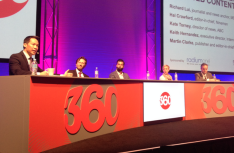Mail Online boss: Reliance on social sharing a flawed business model

Moderator – Richard Lui, journalist and news anchor, MSNBC and NBC News, Hal Crawford, editor-in-chief, Ninemsn, Keith Hernandez, executive director, international strategy, BuzzFeed, Kate Torney, director of news, ABC and Martin Clarke, publisher & editor in chief, MailOnline. Image Mumbrella
The homepage is not dead according to the global editor-in-chief and publisher of the Mail Online Martin Clarke who said today, during a panel discussion on shareable content, that his organisation never considered the sharability of a story and it was very risky to do so as a business model.
“Sharing is not all we think about – we don’t do a story because we think it will get shared, we do it because we think will it get read on our homepage”, Clarke told an audience at a panel discussion at Mumbrella360 today.
“If you have a business model that relies on sharing you are quite vulnerable because you depend on third parties – Facebook could disappear tomorrow.


An alternative to relying on social media to spread the news is the curated news app. Such an app can be made to only share news that are front page worthy, and have most number of ‘likes’ and views.
People are ashamed to share Daily Mail stories because then others would know they read it.